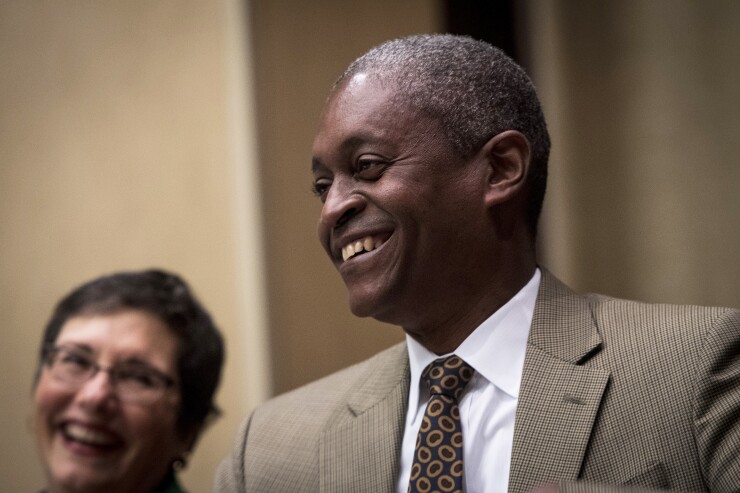A potential trade war is casting doubt over how many times the U.S. central bank will need to raise interest rates this year, according to Federal Reserve Bank of Atlanta President Raphael Bostic, who said it might offset momentum from fiscal stimulus.
“Some of the developments with the trade policy has introduced some uncertainty as to how the economy is going to perform, so I am really taking a wait-and-see attitude,’’ Bostic told reporters Wednesday in Fort Lauderdale, Fla. Asked whether he was deciding between two or three increases, or three or four, he said, “Everything is on the table.’’

Policy makers penciled in three moves this year when they cast projections in December that will be revised later this month. Newly-installed Fed Chairman Jerome Powell told Congress last week that headwinds to U.S. growth had become tailwinds, prompting investors to up their bets that he’ll move four times in 2018. Governor Lael Brainard reinforced that message on Tuesday.
But that outlook could be thwarted if U.S. trade partners retaliate against sweeping tariffs on steel and aluminum planned by President Donald Trump.
“We would take into account developments if they proved to be material to the outlook,” Brainard told a dinner audience in New York. “It’s early to tell what the broader implications could be, so I see it as an uncertainty, but not something that would materially change my outlook, today.”
That sentiment was echoed by Bostic, who in December had favored raising rates just twice this year — making him one of the most dovish members of the rate-setting Federal Open Market Committee — but shifted his projection to three moves. That upgrade was prompted by a $1.5 trillion tax-cut package signed by Trump in December and subsequent government spending agreed by lawmakers. A trade war might change the economic picture.
“We don’t know which products are going to be pulled into this tariff regime,’’ Bostic said. “Europe has signaled it would hit a whole host of other products that are not aluminum or steel, so there is just no real certainty as to which products are going to be pulled into this. Anyone engaged in any international trade spaces has got to have some concern that they could be part of the story here and be at risk of a changing cost reality.’’
Fed officials are expected to raise rates when they meet March 20-21. Powell told lawmakers he wouldn’t prejudge the outcome, though the committee will take account of data that have shown a stronger U.S. economy and signs of inflation moving higher.
Bostic said that trade concerns could well result in lower stock prices, which he described as “through the roof’’ since the election, as investors adjust their profit expectations.
“The increase has not been commensurate with an increase in profits or any of those sorts of things,’’ he said. “If the response happens because there is a trade disruption and profitability for a host of sectors changes, then we could see a pretty significant move.’’
The resignation Tuesday of top Trump economic adviser Gary Cohn, who had been a leading free-trade proponent inside the White House, adds to the uncertainty, Bostic said.
“I would fully expect it to have an impact,’’ he said. “If you look at the economic team, Cohn played a particular role and connected with a segment of the marketplace that is quite important and quite visible.’’





